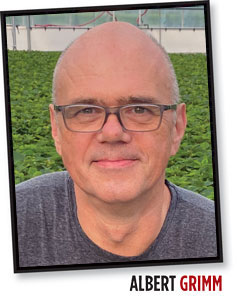2/1/2023
How to Sweep a Floor
Albert Grimm

Back in my college days, it was mandatory to take a course on the art of sweeping floors. We had to pass a “sweeping exam” if we wanted to get our diploma, and we had to demonstrate our knowledge of the practice and theory of brooms.
What was astounding about this course was not its subject, but the fact that it exceeded all my expectations. Sure, we learned a lot about different types of brooms and their applications, and we received practical lessons in ergonomic broom handling techniques, but this was not where my excitement came from. There was a deeper purpose to this experience and it took years to sink in how much we’d learned.
Learning how to do apparently simple and menial work with attention and passion is a path to excellence. We all know that our bosses can compel us to earn our money by sweeping floors, but rarely do we consider it stimulating or fulfilling work. I admit that it’s hard to develop a passion for the handling of a broom. At first glance, there’s no obvious path to a shining display of excellence in this dust-removal business.
Learning how to sweep properly, however, can teach us that excellence doesn’t depend on the nature or complexity of our work, but that it’s always the result of deliberate voluntary efforts. An employer can force us to perform simple and repetitive manual tasks, but nobody can command us to take them seriously and to invest passion into mundanity.
Yet, we have to be willing to practice and repeat with almost Zen-like dedication if we want to master any occupation. We cannot develop proficiency or excellence by merely studying at our desks or by memorizing a textbook or by passing an exam. Everybody can try to sweep a floor, but precious few will offer the commitment that’s necessary to learn how to sweep effectively, efficiently and with enthusiasm. Excellence depends on our willingness to volunteer exceptional effort no matter how mundane the appearance of the task.
An analogy is the process of learning how to play piano. You can study notation and music theory for years. You may even be able to analyze the structure of a Beethoven Sonata. But you won’t be able to play even the simplest of songs on the piano unless you volunteer years of concentrated effort. Your fingers must learn how to hit the right notes at the right time. Those of you who went through the Hanon books know that this means years of repetitive, tedious and boring exercise. There’s no shortcut.
The same applies to seemingly mundane aspects of greenhouse work. You won’t be able to harvest cuttings or pinch plants with simultaneous excellence in precision and speed unless you voluntarily dedicate years of teaching yourself how to touch the plants at the right spot without doing unnecessary damage. Training your fingers and hands takes voluntary concentration, dedication and purposeful repetition.
There’s more: You won’t be able to inspire others into mastering these skills unless you’re able to demonstrate them yourself. You cannot supervise your staff to become better, faster and more accurate unless you can motivate them to take mundane tasks seriously. As a supervisor, you’re a role model and you must be able to show that you’re willing to volunteer the same enthusiasm for ordinary greenhouse work that you expect from others.
People don’t do what you tell them to do; people merely copy what they watch you doing. Piano students need to hear the Beethoven Sonata from a master before they know what it should sound like and what they should strive for. Greenhouse workers need to see the difference that a master can bring to everyday tasks before we can expect them to strive for excellence. If we expect excellence, we must be able to display excellence ourselves, particularly when it comes to mundane aspects of our daily work. There’s no shortcut, not for the student, and neither for the teacher.
My unexpected takeaway from this seemingly silly course on broom handling many years ago was a different perspective towards my work and it still resonates with me today. From time to time, my wife and I volunteer to clean the offices at our company. When we do, I enjoy acting as the resident floor-sweeper and vacuum cleaner specialist. This is no longer work for me; it has become a form of meditation. GT
Albert Grimm is head grower for Jeffery’s Greenhouses in St. Catharines, Ontario, Canada.